“The broad picture remains intact. In terms of economic and fiscal policy, the focus remains very much on reflation,” said Jesper Koll, senior adviser to asset manager WisdomTree Investments. “Longevity will be a struggle.”
RECORD TENURE
The resignation comes just days after Abe surpassed a record for longest consecutive tenure as premier set by his great-uncle Eisaku Sato half a century ago.
But for all his longevity, he failed to deliver on one of his most prized goals – altering Japan’s postwar, pacifist constitution. He also fell short of a full revival of the economy, even before the coronavirus.
“As head of the ruling party he worked hard on Abenomics for eight years,” said Naohito Kojima, 55, a brokerage employee.
“There were various problems but if someone else had been leader, it’s questionable whether they could have maintained a stable government as long as Mr Abe.”
Abe won praise for reasserting Japan’s presence on the global stage after years of revolving-door premiers.
His resignation comes amid an uncertain geopolitical environment, including an intensifying confrontation between the United States and China.
The conservative Abe returned as prime minister for a rare second term in December 2012, pledging to revive growth with his “Abenomics” mix of hyper-easy monetary policy, government spending and reforms. He also pledged to beef up Japan’s defence and revise the constitution.
Abe was instrumental in winning the Tokyo 2020 Olympics.
“We must fulfil our responsibility as the host country of the Olympics,” Abe told the news conference. “Of course, I believe my successor will work to host the Olympics under the same belief.”
UNDER FIRE
Under fire for his handling of the coronavirus and scandals among party members, Abe has recently seen his support fall to one of the lowest levels since taking power in December 2012.
Japan has not suffered the explosive surge in virus cases seen elsewhere – it has had nearly 67,000 cases and 1,255 deaths – but Abe drew fire for a clumsy early response and what critics saw as a lack of leadership as infections spread.
Abe kept his promises to boost spending on the military after years of declines and expanding its capacity to project power abroad. In a historic shift in 2014, his government reinterpreted the constitution to allow Japanese troops to fight abroad for the first time since World War Two.
A year later, Japan adopted laws scrapping a ban on exercising the right to defend a friendly country under attack.
But Abe proved unable to revise the U.S.-drafted, postwar constitution’s pacifist Article 9, a personal mission that also eluded his grandfather, Nobusuke Kishi, who quit as premier in 1960 because of uproar over the U.S-Japan security pact he championed.
Abe resigned from his first stint as prime minister in 2007, citing ill-health after a year plagued by scandals in his cabinet and a huge election loss for his ruling party. He had since kept his illness in check with medicine that was not previously available.



Comment here